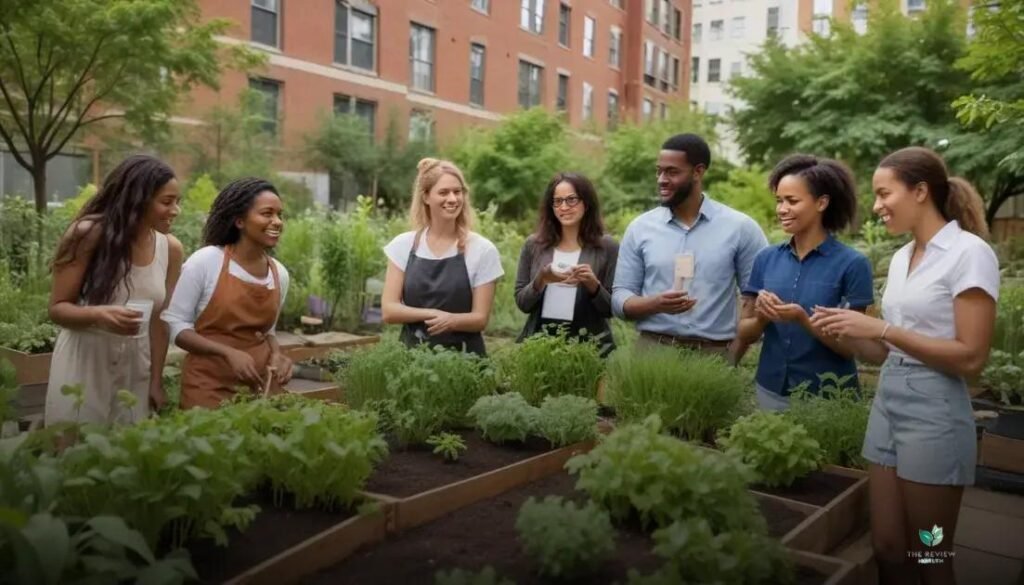Careers in sustainable food encompass diverse roles like farming, research, policy, and technology, all focused on creating an environmentally and socially responsible food system.
Careers in sustainable food are becoming increasingly important as we strive to create a more eco-friendly future. Have you ever thought about how you can contribute? Let’s dive into the exciting opportunities this field offers.
Exploring various careers in sustainable food

The sustainable food sector offers diverse career paths for individuals passionate about food, the environment, and social impact. From farm to table, opportunities abound for those seeking to make a difference. Let’s explore some key areas:
Sustainable Agriculture
Careers in sustainable agriculture focus on environmentally friendly farming practices. This includes roles like organic farmer, agroecologist, and soil scientist. These professionals work to minimize environmental impact while maximizing yields and promoting biodiversity.
Food Waste Reduction
Food waste reduction is a critical area within sustainable food systems. Food waste auditors analyze waste streams, while composting specialists and anaerobic digestion technicians develop solutions for diverting food waste from landfills. Upcycling specialists find creative ways to transform food byproducts into valuable products.
Sustainable Food Policy and Advocacy
For those interested in influencing policy and driving change, careers in sustainable food policy and advocacy offer a platform to make a real impact. Policy analysts research and advocate for legislation that promotes sustainable food practices, while community organizers work to educate and mobilize communities around food system issues.
Sustainable Food Business and Entrepreneurship
Innovation and entrepreneurship are key drivers of change in the food system. Sustainable food entrepreneurs are developing new products and services, from plant-based meat alternatives to innovative packaging solutions. Opportunities exist in areas like food product development, sustainable packaging design, and eco-friendly food retail.
Nutrition and Dietetics
Registered dietitians and nutritionists specializing in sustainable food systems promote healthy eating habits that are also good for the planet. They educate consumers on the environmental impact of food choices and advocate for diets that prioritize plant-based foods, local sourcing, and reduced meat consumption.
Key skills needed for success in this field

A passion for sustainability is a great starting point, but certain skills are essential for thriving in a sustainable food career. These skills can be developed through education, experience, and ongoing learning.
Analytical and Critical Thinking Skills
Analyzing data, evaluating research, and understanding complex systems are crucial. These skills help professionals assess the environmental impact of food systems and develop effective solutions.
Communication and Collaboration Skills
Working effectively with diverse stakeholders, from farmers to policymakers, requires strong communication and collaboration skills. Being able to clearly articulate ideas, build consensus, and work as part of a team is essential.
Problem-Solving and Innovation Skills
The sustainable food sector faces constant challenges, requiring professionals to be adept at problem-solving and innovation. Finding creative solutions to reduce waste, improve efficiency, and promote sustainable practices is key.
Technical Skills
Depending on the specific career path, certain technical skills may be necessary. These can range from agricultural practices like crop management and animal husbandry to data analysis and programming for those working in food tech or research.
Business Acumen
For those pursuing entrepreneurial ventures or management roles, business acumen is vital. Understanding market trends, financial management, and strategic planning can help ensure the success of sustainable food businesses.
How to start a career in sustainable food

Ready to embark on a fulfilling career in sustainable food? Here’s how to get started:
Education and Training
Formal education can provide a strong foundation. Consider pursuing a degree in environmental science, agriculture, food science, or a related field. Look for programs with a focus on sustainability. Online courses and certifications can also provide valuable specialized knowledge in areas like permaculture, urban farming, or food policy.
Gaining Experience
Hands-on experience is invaluable. Volunteer at a local farm, urban garden, or food bank. Internships with sustainable food organizations or businesses can provide practical skills and networking opportunities. Even starting your own small gardening project or composting system can demonstrate your commitment and build your knowledge.
Networking
Connect with professionals in the field. Attend conferences, join online forums, and reach out to individuals working in areas that interest you. Networking can lead to mentorship opportunities, job openings, and valuable insights into the industry.
Job Searching
Utilize online job boards, professional networking sites, and company websites to find relevant job openings. Tailor your resume and cover letter to highlight your skills and passion for sustainable food. Be prepared to showcase your knowledge and enthusiasm during interviews.
Continuous Learning
The sustainable food sector is constantly evolving. Stay up-to-date on the latest trends, research, and best practices by reading industry publications, attending webinars, and engaging in ongoing learning opportunities. This will help you remain competitive and make meaningful contributions to the field.
Building a Sustainable Future, One Career at a Time
Careers in sustainable food offer a unique opportunity to combine your passion for food and the environment with a rewarding and impactful career. Whether you’re interested in farming, technology, policy, or education, there’s a place for you in this growing field. By developing the necessary skills and taking proactive steps, you can contribute to a more sustainable and equitable food system for all. Join the movement and help create a healthier planet, one delicious bite at a time.
FAQ – Frequently Asked Questions About Careers in Sustainable Food
What types of jobs are available in sustainable food?
The sustainable food sector offers diverse career paths, including farming, research, policy, education, technology, and entrepreneurship. Roles range from organic farmers and soil scientists to food policy analysts and sustainable food product developers.
Do I need a specific degree to work in sustainable food?
While a degree in environmental science, agriculture, or food science can be beneficial, it’s not always required. Relevant experience, certifications, and demonstrated passion for sustainability can also open doors to various careers.
How can I gain experience in sustainable food?
Volunteering at farms, urban gardens, or food banks, pursuing internships with sustainable food organizations, and even starting your own small gardening or composting project can provide valuable experience.
What are the most important skills for a sustainable food career?
Key skills include analytical and critical thinking, communication and collaboration, problem-solving and innovation, technical skills relevant to your chosen area, and potentially business acumen for entrepreneurial or management roles.
How can I find job opportunities in sustainable food?
Utilize online job boards, professional networking sites, and company websites specializing in sustainable food or related fields. Networking with professionals in the industry can also lead to job opportunities.
How can I stay up-to-date on the latest trends in sustainable food?
Engage in continuous learning by reading industry publications, attending webinars and conferences, and connecting with professionals in the field through online forums and networking events.

Sarah Thompson is a passionate advocate for healthy living and mindful lifestyle choices. With a background in nutrition science and years of experience as a wellness coach, Sarah dedicates her time to exploring the latest trends, research, and products that promote physical, mental, and emotional well-being.
As the lead writer for The Review Health , Sarah combines her expertise with a genuine love for helping others make informed decisions about their health. Her articles are designed to inspire and educate, offering practical tips, honest reviews, and science-backed insights to support readers on their journey to a healthier, happier life.
When she’s not writing or researching, Sarah enjoys yoga, experimenting with plant-based recipes, and spending time outdoors with her family.



